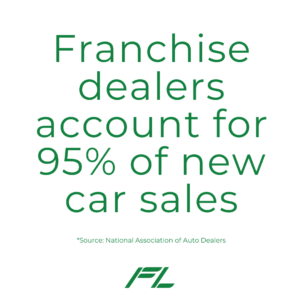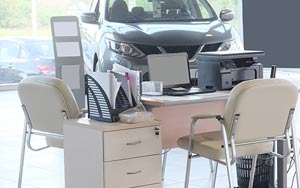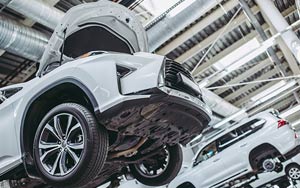From the roaring 1920s to the booming post-war years, the story of Florida’s auto dealerships is a tale of evolution and innovation. With a growing network of roads and an American public captivated by the allure of automotive freedom, Florida became fertile ground for an auto dealership boom. As vehicles became more than a luxury and evolved into a necessity, the Sunshine State’s market responded, laying down the tracks for an industry that would grow and adapt through the decades.
The Beginnings: Post-Model T Boom
Florida’s automotive landscape accelerated as the proverbial dust settled following World War I. This era was marked by an expanding network of roads and an increasing personal desire for mobility among Americans, setting the scene for the automobile boom. The Florida Historical Society captures this period of rapid growth in car ownership, with the 1920s seeing a notable uptick to one car for virtually every five people residing in the state. This burgeoning demand naturally spurred the rise of auto dealerships, catering to a populace eager to enjoy the freedoms that personal transportation afforded.
Communities throughout Florida started to witness the sprouting of auto dealerships, with family-run operations becoming community fixtures. As the number of vehicles on Florida’s roads expanded, dealerships became an important part of the local economy, driving employment and contributing to municipal growth. In turn, this initial period laid the groundwork for the state’s automobile sector, reflecting the national enchantment with the automotive revolution. This upswing in auto sales and the gradual shift in societal mobility preferences set a robust foundation for what would become a booming industry in the Sunshine State.
Post-War Suburbia and Auto Expansion
Following the end of World War II, there was a marked shift in the United States’ demographic patterns, with Florida at the forefront of these changes. The state’s warm climate, coupled with the burgeoning aerospace and defense industries, fueled a significant migration southward. As the US Census Bureau illustrates, Florida’s population surged by a staggering 78% between 1940 and 1960, complementing a national trend toward suburban living. This demographic swell directly impacted the auto industry, as the spread of suburbia increased reliance on personal vehicles.
The thriving economy of the post-war era greatly enhanced the average American’s purchasing power. Cities like Miami and Tampa became epicenters for automotive sales, experiencing a dealership boom that catered to the new suburbanites who required cars for commuting, leisure, and family life. With this shift, dealerships endeavored to improve the buying experience by offering a variety of services. Innovative approaches to financing and customer service began to emerge, as dealerships adapted to a competitive market where the choice and convenience of the buyer became paramount. This revolution within the auto sales sector not only fueled the economy but also transformed the cultural landscape of Florida.
The Age of Consolidation and Franchising
 As the decades rolled on, Florida’s auto industry landscape experienced another significant alteration. The 1980s marked the dawn of the age of consolidation and franchising, a pivotal moment where many small, independent dealerships were absorbed by more extensive, franchised networks. The data provided by the National Association of Auto Dealers underpins this trend, noting that by this time, franchised dealers had secured roughly 95% of new car sales nationwide—a testament to the shift in industry dynamics. In Florida, this consolidation optimized dealership operations and improved inventory management, creating a more streamlined and customer-focused sales approach.
As the decades rolled on, Florida’s auto industry landscape experienced another significant alteration. The 1980s marked the dawn of the age of consolidation and franchising, a pivotal moment where many small, independent dealerships were absorbed by more extensive, franchised networks. The data provided by the National Association of Auto Dealers underpins this trend, noting that by this time, franchised dealers had secured roughly 95% of new car sales nationwide—a testament to the shift in industry dynamics. In Florida, this consolidation optimized dealership operations and improved inventory management, creating a more streamlined and customer-focused sales approach.
These larger franchised dealerships began leveraging their scale to offer a broader range of vehicles and services. Competitive pricing, extensive warranty options, and professionalized customer service became the hallmarks of these establishments, driving further growth. This era saw the birth of mega-dealerships that transformed the skylines of metropolises throughout Florida, from Jacksonville’s sprawling sales lots to the glittering showrooms of Miami. These changes not only elevated the prominence of Florida’s auto industry but also mirrored a nationwide evolution towards a dealership model built for efficiency and mass-market appeal.
The Modernization of Dealerships
At the turn of the 21st century, Florida’s auto dealerships began embracing a wave of modernization that would redefine the car buying experience. With technological advances, dealerships invested heavily in digitizing their sales and inventory systems. This shift not only streamlined operations but also provided consumers with unprecedented access to dealership services.
The Digital Shift and Online Sales
The rise of the internet brought about an unprecedented change in how auto dealerships in Florida conducted business. The late 20th and early 21st centuries heralded the advent of online sales and digital marketing, transforming the traditional dealership model. The Florida Department of Highway Safety and Motor Vehicles reported a burgeoning trend in this domain, with a whopping 150% increase in online car sales from 1998 to 2008. Dealerships were quick to recognize the potential of the internet, leading to the establishment of online showrooms and the listing of inventories on digital platforms.
Additionally, as the digital age progressed, Florida dealerships bolstered their online presence with sophisticated websites and virtual car tours, providing customers with detailed information and interactive experiences before stepping foot on the lot. The convenience of online financing calculators, appointment schedulers, and live chat support further streamlined the customer journey, capitalizing on the growing penchant for online shopping among consumers.
The integration of e-commerce platforms allowed customers to initiate and, in some cases, complete their vehicle purchases online. As a testament to the industry embracing change, this digital shift did not merely supplement in-person sales but emerged as a primary sales channel for many Florida auto dealers.
Digital marketing strategies evolved to become a cornerstone of the auto sales process. Dealerships in cities such as Fort Lauderdale and St. Petersburg invested in search engine optimization (SEO), social media marketing, and pay-per-click (PPC) advertising aiming to capture the attention of potential buyers as soon as they started their vehicle search online. This proactive approach to online engagement was pivotal in attracting a tech-savvy demographic and maintaining a competitive edge in an increasingly digital marketplace.
The Rise of Eco-Friendly Vehicles
Florida’s auto dealerships have adjusted their sails to the rising demand for eco-friendly vehicles. Metropolitan areas, such as Tampa, Orlando, and Miami, became showcases for this expanding market, as dealerships increasingly stocked hybrids and electric vehicles (EVs). These eco-conscious choices echoed the sentiments of a population keen to reduce carbon footprints, and dealers noticed a definitive uptick in sales of such models.
The state’s incentives for green vehicle purchases further stimulated this sector. Transitioning smoothly, dealerships expanded their inventory and educated their sales forces on the benefits and nuances of EVs and hybrid technologies.
The Impact of COVID-19 on Auto Dealerships
COVID-19 was an extreme stress test for industries worldwide, and Florida’s auto dealerships were no exception. Adherence to social distancing protocols accelerated the adoption of digital showrooms and contactless services. Notably, the Florida Independent Automobile Dealers Association recorded a 70% spike in online vehicle purchase inquiries that year, a clear indicator of the pandemic’s transformative impact on auto sales.
In addition, the pandemic necessitated a review of traditional sales practices. Dealerships across the state rapidly adapted, implementing fully online transaction processes for the first time. This shift was not merely a temporary answer to the crisis but a forward step, likely to set a precedent for future auto retailing strategies. As a silver lining, these adaptations showcased the industry’s resilience and commitment to meeting customer needs, regardless of external challenges.
Auto Dealerships Looking Forward
As Florida’s auto dealerships steer into the future, the road ahead is paved with technological advancements and customer-centric innovations. The integration of virtual reality (VR) tech is becoming increasingly popular, offering immersive test drives and detailed interior inspections without the need for physical presence. This cutting-edge approach suggests a near future where the line between digital and physical dealership experiences continues to blur.
The industry is leaning towards more personalized services, leveraging big data analytics to tailor offerings to individual consumer preferences. Innovative customer service tools, such as AI-powered chatbots and personalized recommendations, are set to revolutionize the engagement process. Looking ahead, the focus remains sharply on enhancing the efficiency and enjoyment of the car buying journey, assuring Florida’s position at the forefront of dealership innovation.
As Florida’s auto dealerships cruise into tomorrow, they are fueled by an ever-changing technological landscape and the shifting needs of consumers. From embracing virtual reality to adapting to a digital marketplace, dealerships are rewriting the rules of customer engagement, ensuring they stay in the driver’s seat of industry advancement. Looking back on their journey from humble beginnings to their current trajectory, it’s clear that the road ahead will be shaped by innovation, with Florida’s auto dealerships continuing to redefine the car buying experience.




